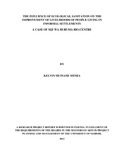| dc.description.abstract | The purpose of the study was to investigate the influence of ecological sanitation on the
improvement of livelihoods of people living in informal settlements. The study focused on
the case of Mji wa Huruma's Bio-Centre project and was guided by the following objectives:
to assess the extent to which technical skills imparted to the community has improved the
livelihoods of people living in the informal settlements; to assess the extent to which
environmental awareness & sanitation promotion has improved the livelihoods of people
living in the informal settlements; to establish the relationship between the level of financing
of the ecological sanitation systems and the improvement of livelihoods in informal
settlements; and to evaluate the effectiveness of the management of the ecological sanitation
systems on improvement of livelihoods of people living in informal settlements. The
literature review provided a global/regional view of sanitation and ecological sanitation; and
explained the influence of ecological sanitation on improvement of livelihoods of people in
the informal settlements. The research design was descriptive in nature and utilized a mixedmethods
design; in particular, an explanatory mixed methods design. A mixed method of
sampling was used to select the sample size which was ninety six (96) in total constituting
officials of Mji wa Huruma's Bio-Centre project and Mji wa Huruma residents. Data was
collected by administering questionnaires, use of focus group discussions and observation
and then analyzed using both quantitative and qualitative methods. The collected data from
the questionnaires and interview guides was analyzed using Statistical Package for Social
Sciences (SPSS) program. Study findings indicated that although it is evident that ecological
sanitation has influenced the improvement of livelihoods of people living in informal
settlements through technical skills imparted to the community, environmental awareness and
sanitation promotion, level of financing and effectiveness of the management of the
ecological sanitation, there are a few mechanisms that are either not known to the residents or
are not functioning as stated by the officials. For instance, the researcher established that the
small fee charged for using the Bio-latrine discouraged quite a number of residents from
using the facility. Also, lack of electricity at the Bio-Centre encouraged the use of pit latrines
and to a large extent open defecation during the night hours. Lastly, the state of Ruaka river
was not good since a lot of human activities were being undertaken on the river plus all the
drainage systems in the settlement were directed towards it. The researcher recommended to
UNEPlUmande trust that electricity should be installed at the Bio-Centre to enable the
community to use the facility during the night. Also, in order to encourage the use of the Bio-
Centre by the entire population thereby realizing the full effects of ecological sanitation,
UNEPlUmande trust should for a specified period (two years) bear the cost of operating the
facility. A further study should be undertaken with a larger sample that includes Bio-
CentreslBio-latrines all over Kenya, as different results may be found. | en |

